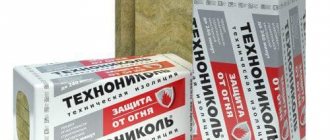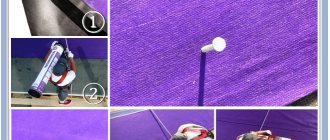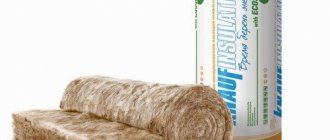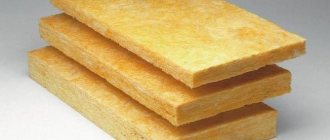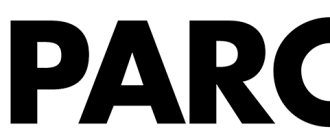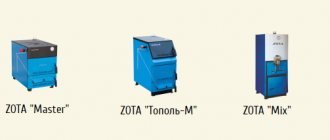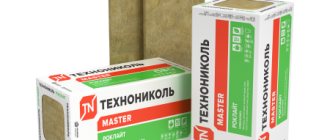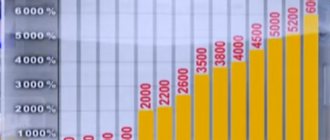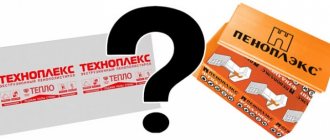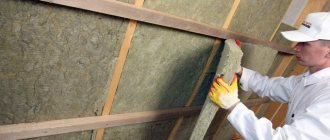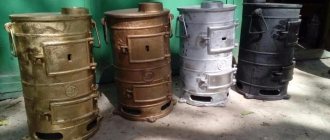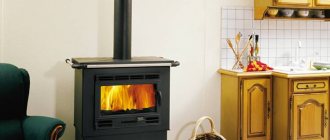Thermal insulating materials from the Russian company Technonikol have been in deserved demand in the construction market for more than 10 years.
Consumers note a wide range of products with a high level of quality and compliance with modern standards. An important role is played by the adaptation of the technical characteristics of TechnoNIKOL thermal insulation to the weather conditions on the territory of Russia, and, accordingly, to the operating mode of the constructed facilities. Please also pay attention to competitors: KNAUF, Isover.
Among TechnoNIKOL's products there are two more or less familiar types of insulation, as well as a new type of moisture-proof thermal insulation:
RECOMMENDED ON THE TOPIC
- Mineral wool characteristics…
- Lego brick: what is it and...
- insulation based on mineral wool, namely basalt wool in the form of slabs and flexible mats;
- solid insulation in the form of slabs of extruded polystyrene foam;
- rigid thermal insulation based on polyisocyanurate foam, characterized by ultra-low water absorption.
Within these large groups, products are distinguished by a specific area of use, and, accordingly, by technical characteristics.
How it is made
When producing TechnoNIKOL mineral wool, the rock is pre-loaded into melting furnaces and heated to a temperature of 1400-1500 degrees. Next, the molten rock mass is poured into a special centrifuge.
Here, spinning tops rotating at speeds of up to 7000 rpm tear it into small fibers. During this procedure, binders are poured into the centrifuge . At the next stage, the fibers already impregnated with phenol-formaldehyde resin enter the lamella machine and are formed into a carpet of a given thickness.
Mineral wool of the TechnoNIKOL brand is manufactured by the domestic company of the same name, founded at the end of the last century. At the moment, it includes more than 20 enterprises and 120 retail outlets operating throughout the country. Mineral wool from this manufacturer is made from high-quality materials using modern equipment, and therefore is extremely popular not only in Russia, but also abroad.
Scope of application
Mineral wool from this manufacturer, like any other, is used, most often for insulation of building envelopes: walls or roofs .
It is also used for insulating doors, pipelines, attic and attic floors, etc. The main advantage of mineral wool in comparison with another popular insulation material today, expanded polystyrene, is considered non-flammability. Therefore, it can also be used to insulate chimneys when passing them through ceilings and roofs.
Some disadvantage of this material is its hydrophilicity. Stone wool absorbs moisture very well. However, Technonikol brand slabs in this regard are considered to be quite reliable and of high quality. During the production process, they are impregnated with special hydrophobic compounds, which significantly increases their resistance to moisture significantly.
Mat TechnoNIKOL Teploroll
TEPLOROLL is a lightweight, hydrophobized, non-flammable heat and sound insulating mat made of mineral wool based on basalt group rocks. This is a universal material for private construction.
Application area
The TEPLOROLL material is recommended for use in cottage and low-rise construction as heat and sound insulation of horizontal, inclined and vertical structures, such as attics, frame walls, walls with siding, floors and ceilings, partitions.
Advantages
- Convenience and ease of installation
- High installation speed
- Ease of transportation
Basic physical and mechanical characteristics
| Parameter name | HEATROLL |
| Compressibility, % no more | 55 |
| Flammability group | NG |
| Thermal conductivity at 10 °C, W/(m.°C) no more | 0,036 |
| Thermal conductivity at 25 °C, W/(m.°C) no more | 0,038 |
| Thermal conductivity under operating conditions A, W/(m°C) no more | 0,040 |
| Thermal conductivity under operating conditions B, W/(m°C) no more | 0,041 |
| Humidity by mass, % no more | 2,0 |
| Content of organic substances, % no more | 2,0 |
| Length, mm | 4000 (3000 with a thickness of 150) |
| Width, mm | 1000 |
| Thickness, mm | 50, 100, 150 |
| Average density, kg/m3 | 25-35 |
| Elasticity, % not less | 55 |
PriceRUB/packaging415from
Rocklight mineral wool insulation
Rocklight mineral wool is a non-flammable slab with low thermal conductivity, made from basalt rocks; the material is intended for work on heat and sound insulation of residential and industrial premises. Ease of installation and good performance qualities were appreciated by numerous specialists and many craftsmen and private developers.
Rocklight slabs are designed for heat and sound insulation of building structures of residential buildings and industrial buildings in which the insulation does not support external loads. Recommended for use as insulation in horizontal, inclined and vertical structures, such as: ventilated coverings of pitched roofs, attics, attic floors, floors with insulation installed between joists, walls finished with siding (layered masonry), frame walls and partitions.
Distinctive features of Rocklight mineral wool
- Rocklite does not react with alkali and metal.
- Has low water absorption.
- Not attractive to insects and mice, not susceptible to fungi.
- It is environmentally friendly and breathable.
Specifications
| Indicator name | Value for ROCKLITE grade slabs |
| Density, kg/m3, no more | 30 |
| Compressibility, % no more | 30 |
| Thermal conductivity at 25 °C, W/(m K), no more | 0,042 |
| Thermal conductivity under operating conditions A, W/(m K) no more | 0,048 |
| Thermal conductivity under operating conditions B, W/(m K) no more | 0,051 |
| Water absorption at full immersion, % by volume, no more | 1,5 |
| Content of organic substances, % by weight, no more | 2,5 |
| Flammability, degree | n/a |
PriceRUB/packaging530from
Advantages and disadvantages
Each type of TechnoNIKOL brand insulation presented on the building materials market has its own strengths and weaknesses.
Basalt wool
Among the advantages of wool made from basalt fibers:
- good thermal insulation properties;
- durability;
- resistance to heat - the material is non-flammable, can withstand temperatures up to +1000oC;
- lack of hygroscopicity;
- vapor permeability;
- good level of airborne noise absorption;
- versatility - you can insulate any structural elements of a building;
- resistance against fungus and mold;
- simple installation - all work can be completed without hiring hired workers;
- convenient delivery to the work site;
- high elasticity, which allows the slabs to be mounted in the sheathing cells in a spacer;
- environmental safety for homeowners.
Among the disadvantages :
- high cost of the product;
- heterogeneous structure of mineral insulation with low density;
- a significant difference, judging by reviews on forums, in the thermal insulation properties and durability of budget line materials and expensive ones;
- dust generated during the work process.
Important: the company was the first in the world to introduce basalt insulation, which does not generate dust.
Extruded polystyrene foam
The main advantages of extruded polystyrene foam (EPS) are low thermal conductivity and low weight. But other strengths are no less significant:
- long service life - the company assures that the EPS durability is 50 years or more;
- ability to maintain original characteristics in the temperature range from -50oC to +75oC;
- high level of water resistance - absorbs no more than 0.2% moisture when completely immersed in water;
- resistance to compression - high-density material can withstand pouring screed up to 10-15 cm thick;
- not subject to rotting and decomposition processes - a synthetic product, so it takes hundreds of years to decompose;
- is not a base for the proliferation of pathogenic microflora (mold and fungi);
- exhibits inertness towards most types of household chemicals and paint solvents;
- frost resistance - there is nothing to freeze due to the complete absence of moisture inside the EPS boards;
- easy to install - you can do the insulation work yourself;
- has good adhesion to building materials: plaster mortars, putty, paint.
disadvantages , but some of them become the main reason for refusing to use XPS in private construction:
- there is no vapor permeability - the walls do not “breathe”, and therefore good ventilation is necessary;
- background noise increases - the plates resonate, amplifying the sounds;
- high sensitivity to ultraviolet rays - under the sun it quickly ages and deteriorates;
- high cost 1 m3;
- incompatibility with rodents - they happily make nests, gnawing out numerous passages;
- flammability, which the manufacturer honestly informs about.
PIR boards
Insulation made from PIR raw materials has many advantages, which should make the material a leader in the market of thermal insulation materials for many years. Among them:
- the lowest thermal conductivity among all types of insulation;
- long service life due to the applied layer of protection made of foil or lavsan - 50-60 years;
- simple fastening to insulated surfaces - all repair and construction work can be done independently;
- environmental cleanliness;
- resistance to household chemicals and colonies of microorganisms (mold and mildew);
- low specific gravity;
- lack of hygroscopicity;
- versatility;
- wide temperature range in which the insulation retains its performance characteristics - from -200oC to +130oC;
- lack of linear expansion during sudden temperature changes;
- low fire hazard class - classified as self-extinguishing (G1);
- can be machined, which allows, if necessary, reuse;
- resistance to decomposition processes: rotting and corrosion.
The manufacturer claims good noise insulation properties and resistance against rodents. In reality, this is just a publicity stunt. Therefore, these two factors can be attributed to the disadvantages of the product. But the most important drawback is the high price. Another drawback of PPU boards is the fear of ultraviolet radiation, which the company perfectly mitigated by protecting the sheets with foil, which at the same time perfectly reflects heat rays back into the room.
TechnoLIGHT EXTRA
TECHNOLIGHT Extra slabs are non-flammable, hydrophobized sound and heat insulating slabs made from mineral wool (based on basalt group rock).
TECHNOLIGHT slabs are used at temperatures ranging from minus 60 °C to plus 400 °C. The high melting point of insulation fibers (more than 1000°C) determines its non-flammability property.
Technolight Extra slabs are produced using the most modern technologies, which allows us to obtain an environmentally friendly product that is safe for human health and life. The production of Technolight Extra insulation is carried out from basalt mineral fibers, bonded with a specially prepared organic binder (to increase the thermal insulation properties of the slabs, strength, elasticity, etc.). Thanks to the binder, the material acquires water-repellent properties and durability. This material is neutral to chemical influences with various substances and does not attract rodents (insects).
Technical characteristics of Technolight Extra insulation:
| Average density, kg/m3 | 34 |
| Thermal conductivity of plates (10°C), W/(m.oC) no more | 0,036 |
| Thermal conductivity of plates (25°C), W/(m.oC) no more | 0,038 |
| Thermal conductivity of slabs (operating conditions A), W/(m.oC) no more | 0,039 |
| Thermal conductivity of slabs (operating conditions B), W/(m.oC) no more | 0,04 |
| Vapor permeability of slabs, mg/(m.h.Pa) not less | 0,30 |
| Humidity by weight, percent, no more | 0,5 |
| Water absorption by volume, percent, no more | 1,5 |
| Content of organic substances, percent, no more | 2,5 |
| Flammability degree | NG |
Purpose, area of application of Technolight Extra insulation:
Building structures of buildings and structures (industrial and civil) very often require additional thermal and sound insulation. TECHNOLITE Extra slabs, designed for surfaces that do not bear large external loads, will help them with this. Insulation boards are actively used in work with attic-type superstructures, pitched roofs of buildings (with ventilated covering), attics, attic floors, floors with insulation laid between joists, partitions, frame walls, etc. TECHNOLITE Extra boards are recommended for use on both horizontal and vertical surfaces and on inclined surfaces.
TechnoRUF
TECHNORUF N30 – mineral wool slabs based on rocks of the gabbro-basalt group, produced on the most modern equipment in accordance with high quality standards. The material is a strong chaotic interweaving of mineral basalt fibers, followed by impregnation with a special water-repellent composition. The multidirectional nature of the fibers makes the material durable, provides high heat and sound insulation characteristics, and thanks to the stone base, cotton wool is a non-flammable material.
ADVANTAGES OF TECHNORUF H30 :
- long service life
- high temperature resistance
- high compressive strength
- environmental friendliness
- high thermal conductivity resistance
- low moisture absorption
- high sound absorption
- resistance to microorganisms and parasites
- chemical resistance
- ease of installation;
- wide temperature range of use (from -60 to 400 °C).
Technical characteristics: stone wool TECHNORUF N 30:
| Index | TECHNORUF N 30 |
| Density, kg/m3 | 100-130 |
| Compressive strength at 10% deformation, kPa not less | 30 |
| Thermal conductivity at 25°C, W/(m°C) no more | 0,038* |
| Thermal conductivity under operating conditions A, W/(m°C) no more | 0,041* |
| Thermal conductivity under operating conditions B, W/(m°C) no more | 0,042* |
| Vapor permeability, mg/(m.h.Pa) not less | 0,3 |
| Humidity by mass, % no more | 0,5 |
| Water absorption by volume, % no more | 1,5 |
| Content of organic substances, % no more | 4,5 |
| Concentrated load, not less, N | 400 |
| Flammability, degree | NG |
Price
RUB/m3
6515
from
Mineral wool boards Tekhnoruf 45 are the latest high-quality material at a low price. Made from mineral fibers of basalt rocks. The fibers are held together by an organic binder. Also, to impart hydrophobic properties, the material is coated with special water-repellent impregnations. Thanks to the use of the latest technologies, the material, in addition to high compressive strength, durability, hydrophobicity, high sound and heat insulation properties, and non-flammability, is environmentally friendly and does not pose a threat to human life and health.
Technical characteristics of Tekhnoruf 45
| Parameter name | Tekhnoruf 45 |
| Density, kg/m3 | 126-154 |
| Compressive strength at 10% deformation, kPa, not less | 45 |
| Thermal conductivity at 10 °C, W/(m.°C) no more | 0,036 |
| Thermal conductivity at 25 °C, W/(m.°C) no more | 0,038 |
| Thermal conductivity under operating conditions A, W/(m°C) no more | 0,043 |
| Thermal conductivity under operating conditions B, W/(m°C) no more | 0,046 |
| Vapor permeability, mg/(m.h.Pa) not less | 0,30 |
| Humidity by mass, % no more | 0,5 |
| Water absorption by volume, % no more | 1,5 |
| Flammability, degree | NG |
You can check the full range of TechnoNIKOL mineral basalt insulation by calling. (8512) 48-26-48
Price list for basalt thermal insulation materials TechnoNIKOL
TechnoLIGHT Optima
Mineral wool insulation Technolight Optima is a modern soundproofing insulation material that is actively used on horizontal, vertical, and inclined surfaces (not experiencing high physical stress). Insulation boards are actively used in work with attic-type superstructures, roofs of buildings (with ventilated covering), attics, attic floors, etc. This material is well suited for the construction of partitions in rooms, as a result of which minimal audibility is achieved between shared rooms. This material will last for many years without changing its quality characteristics. The non-combustibility of Technolight Optima insulation will provide high fire protection characteristics for any type of use (floor, partition, etc.).
Technical characteristics of TechnoLIGHT Optima slabs
| Average density, kg/m3 | 38 |
| Thermal conductivity of plates (10°C), W/(m°C) no more | 0,033 |
| Thermal conductivity of plates (25°C), W/(m°C) no more | 0,037 |
| Thermal conductivity of slabs (operating conditions A), W/(m°C) no more | 0,039 |
| Thermal conductivity of slabs (operating conditions B), W/(m°C) no more | 0,041 |
| Vapor permeability of slabs, mg/(m.h.Pa) not less | 0,3 |
| Humidity by weight, percent, no more | 0,5 |
| Water absorption by volume, percent, no more | 1,5 |
| Content of organic substances, percent, no more | 2,5 |
| Flammability degree | NG |
PriceRUB/packaging786from
TechnoBLOCK STANDARD
Basalt wool TechnoBLOK STANDARD is one of many insulation materials produced from basalt rocks under the influence of heat treatment with the addition of a synthetic binder. This type of mineral wool is widely used as heat and sound insulation for various industrial and residential construction structures. A prerequisite for the use of Standard technoblock slabs is the absence of external loads on the insulation.
Technoblock insulation is used to insulate horizontal and vertical surfaces of enclosing structures in buildings of any type, but it has found its most widespread use in cottage frame construction.
TECHNOBLOCK slabs have:
- low level of thermal conductivity;
- resistance to high temperatures;
- stability of shape and volume;
- low water absorption rate;
- high sound absorption capacity;
- resistance to rodents and various microorganisms;
- neutrality when interacting with various building materials and concrete;
- ease of installation;
- ease of processing and cutting (cut with a saw or knife).
Main characteristics of TECHNOBLOCK STANDARD
Name of indicatorIndicator
| Compressibility, no more | 8 % | |
| Flammability | NG | |
| Thermal conductivity | 0.037 W/m S | |
| Vapor permeability, not less | 0.3 mg/(m h Pa) | |
| Humidity by weight, no more | 0,5 % | |
| Water absorption by volume, no more | 1,5 % | |
| Content of organic substances, no more | 2,5 % | |
| Density | 40-50 kg/m3 | |
PriceRUB/UP740from
Mineral wool for insulation of floors and flat roofs
If it is necessary to lay a layer of insulation of this type under the floor, then you should choose a material with the highest density. The following types of TechnoNIKOL insulation are suitable for this purpose:
- “Teploroll” is most often used for floor insulation, but, if necessary, the material can be used to protect a flat roof.
- “Rocklight” is a material of increased density, therefore it is ideal for insulating horizontal surfaces that will be subject to increased mechanical loads.
The listed types of TechnoNIKOL insulation are ideal for a flat roof or floor, but the use of other types of insulation for these purposes is also possible, provided that the material installation technology is followed.
TechnoACOUSTIC
Technoacoustic thermal insulation boards are non-flammable, sound-absorbing mineral wool boards based on basalt group rocks.
The special arrangement of fibers provides high sound-absorbing properties. Recommended for use as a sound absorber in the construction of frame-sheathing partitions and cladding, in the construction of suspended ceilings, as well as in ceilings with a non-loaded installation of insulating material. The use of TECHNOACUSTIC in the above structures ensures their compliance with building codes and regulations, fire safety requirements and environmental comfort. High physical and mechanical properties ensure reliable operation of the material in vertical structures for more than 50 years.
The use of modern highly effective sound insulation TECHNOAKUSTIK gives higher sound insulation rates and allows you to save on the supporting structure. The main advantages of TECHNOACUSTIC sound insulation are:
- High sound insulation ability;
- Stability of volume and shape, the insulation does not shrink;
- Low water absorption;
- The insulation is resistant to microorganisms and rodents;
- Neutrality in contact with concrete and metal materials;
- Easy installation of insulation, ease of cutting and processing
- Fire safety (NG group)
| Indicator name | Unit measurements | TECHNOACUSTIC | Test method | |
| Compressibility, no more | % | 10 | GOST 17177 | |
| Flammability | degree | NG | GOST 30244 | |
| Thermal conductivity | λ10 | W/m·S | 0,035* | GOST 7076 |
| λ25 | 0,037* | GOST 7076 | ||
| λ A | 0,039* | GOST 7076 SP 23-101-2004 | ||
| λ B | 0,040* | GOST 7076 SP 23-101-2004 | ||
| Vapor permeability, not less | mg/(m h Pa) | 0,3 | GOST 25898 | |
| Humidity by weight, no more | % | 0,5 | GOST 17177 | |
| Water absorption by volume, no more | % | 1,5 | GOST R EN 1609 | |
| Content of organic substances, no more | % | 2,5 | GOST R 52908-2008 (EN 13820-2003) | |
| Density | kg/m3 | 38-45 | GOST R EN 1602 | |
| Sound absorption class for the total thickness of the insulation layer: | 50 mm | NSV | 212 | GOST R – 16297-80 GOST 27296-87 |
| 100 mm | NSV | 211 | ||
| 150 mm | NSV | 211 | ||
| 200 mm | NSV | 111 | ||
PriceRUB/packaging887from
Advantages and disadvantages
Manufacturing facility .
Any material has its pros and cons, without considering which its characteristics will be incomplete. Let's start with the positive qualities.
Mineral wool resists fire well.
Advantages of TechnoNIKOL cotton wool:
- Basalt raw materials . Cotton wool is produced only from high-quality raw materials of the gabbro-basalt group, as a result the material does not burn, does not cause allergies, and has good technical characteristics;
When insulating the floor, the slabs are laid between the joists.
- High quality binder . Any slabs made of mineral fibers are impregnated with organic resins containing phenol and formaldehyde. TechnoNIKOL uses only high-quality resins in which these dangerous toxins are bound and are not released;
The fibers do not cause itching or allergies.
- A wide range of . You can choose the insulation that is best suited for your purposes. The manufacturer is constantly expanding its product range for your convenience;
Good noise absorption makes it possible to lay gypsum plasterboard material for filling walls.
- Precise geometry . Mats and especially slabs have clearly defined dimensions, which are maintained from product to product with millimeter accuracy. This facilitates the calculation and installation of insulation;
The photo shows that the dense mats can support the weight of an adult man.
- Easy installation . The insulation of this brand is distinguished by the possibility of installing it yourself without the involvement of specialists. As a result, the price of insulation is much lower;
Basalt wool is successfully used for insulating facades.
- Durability . The company's products have a long service life, exceeding 50 years (subject to the conditions of use and installation).
The instructions allow you to work with mineral wool yourself, without the involvement of specialists.
Disadvantages of mineral wool:
- Dust release . Even basalt raw materials cannot completely protect against dust. Although it does not cause itching or pricking, inhaling it can be harmful to health, so it is recommended to cover the slabs with membranes;
It is better to work with mineral wool wearing gloves and a respirator.
- Vapor permeability . Although the fibers themselves do not absorb moisture, it can accumulate inside the wool in the form of steam and droplets, increasing its thermal conductivity. It is recommended to use a vapor barrier for laying slabs and mats;
- High price . Basalt wool is more expensive than any similar insulation, it is more expensive than expanded polystyrene and a number of other materials. In return you get security and good insulation.
TechnoVENT
TECHNOVENT is a non-flammable, hydrophobized heat- and sound-insulating slab made of mineral wool based on basalt group rocks with a low-phenolic binder.
TECHNOVENT slabs are intended for use in industrial and civil construction as a heat and sound insulation layer in ventilated facade systems.
Main technical characteristics of TechnoVENT thermal insulation boards
| Tensile strength, not less | kPa | 3 | 5 | 8 | |
| Flammability | degree | NG | NG | NG | |
| Thermal conductivity | λ25 | W/m•S | 0,036 | 0,036 | 0,037 |
| λ A | 0,038 | 0,038 | 0,039 | ||
| λ B | 0,039 | 0,040 | 0,041 | ||
| Compressibility, no more | % | 2 | 2 | 2 | |
| Compressive strength at 10% deformation, not less | kPa | 10 | 12 | 15 | |
| Vapor permeability, not less | mg/(m•h•Pa) | 0,3 | 0,3 | 0,3 | |
| Humidity by weight, no more | % | 0,5 | 0,5 | 0,5 | |
| Water absorption by volume, no more | % | 1,5 | 1,5 | 1,5 | |
| Content of organic substances, no more | % | 3,0 | 3,0 | 3,0 | |
| Density | kg/m3 | 72-88 | 81-99 | 90-110 | |
Technovent OPTIMA basalt insulation is a non-flammable, hydrophobized mineral slab of increased rigidity made of mineral wool (mineral wool) based on basalt group rocks for insulation and sound insulation of ventilated facades.
TECHNOVENT Optima basalt insulation is intended for use as an insulation layer in curtain wall systems with an air gap. The insulation can be used for single-layer facade insulation and as the top layer of insulation for double-layer thermal insulation. The increased density allows the use of TECHNOVENT Optima insulation with facade insulation systems without windproof film.
TECHNOVENT Optima basalt mineral wool insulation (mineral wool) has increased density and excellent physical and mechanical properties, ensuring reliable operation of the insulation in vertical enclosing structures of insulation systems for ventilated facades for a period of more than 50 years.
TECHNOVENT Optima insulation is environmentally friendly, non-flammable (NG), has high sound insulation properties and does not change its properties over time. Due to its high vapor permeability, the insulation allows excess moisture to be removed from the room. The main advantages of TECHNOVENT Optima insulation are:
- Low thermal conductivity;
- High physical and mechanical characteristics;
- Low water absorption;
- The insulation can be used without windproof films
- Neutrality in contact with concrete and metal materials;
- Fire safety (NG group)
Technovent STANDARD is a highly reliable, durable, special mineral wool insulation for ventilated facades. Its use guarantees a long period of heat and sound insulation without replacement or new financial investments. Technovent STANDARD – for the best facades they choose the best insulation!
TechnoVENT PROF
TECHNOVENT PROF mineral wool board is a non-flammable, hydrophobized heat and sound insulating board made of mineral wool based on basalt group rocks. TU 5762-043-17925162-2006
Scope of application of Technovent PROF In civil and industrial construction as a thermal insulation layer during the construction and reconstruction of buildings and structures for various purposes. TECHNOVENT PROF mineral wool boards are intended for use as a thermal insulation layer in insulation systems with a ventilated air gap of external walls of buildings (ventilated facades).
Innovative PIR insulation TechnoNIKOL
The mats are made of polyisocyanurate foam. The structure of the plates is hermetic cells, the external insulation is covered with a layer of foil. This solution improves thermal efficiency - the thermal conductivity coefficient is reduced to 0.021 W/m*C. An innovative polymer is used to insulate the fuel tank of rockets.
A 1.6 cm layer of PIR insulation is equivalent in thermal efficiency to a 1.34 m concrete wall.
Polyurethane is considered the toughest elastomer - a compressive strength of more than 120 kPa. The excellent characteristics of insulation make it popular when installing flat roofs. Reviews about PIR insulation are positive - the material is lightweight, easy to install, durable, and the aluminum layer increases its fire resistance.
Technonikol products are in active demand. Main advantages: wide range of choice, high quality and loyal pricing policy.
Detailed description
Before purchasing TechnoNIKOL stone wool, you need to familiarize yourself with its technical characteristics in more detail.
Coefficient of thermal conductivity
This stone criterion may vary depending on the type of material. Be within the range of 0.034 to 0.047 W/m*S. Thus, it becomes clear that 10 cm of insulation can retain thermal energy just as well as 38 cm of timber or 140 cm of brick.
The photo shows the thermal conductivity of TechnoNIKOL stone wool:
The insulation process using TechnoNIKOL wool is carried out in 1-2 layers.
Density of slabs
This characteristic of the material is determined by the thermal conductivity coefficient. If we consider the material Rocklight and Technolight, then its density is 30-40 kg/m3, but the material Technoflor, which is used to insulate the floor under the screed, this figure is 81-185 kg/m3.
Degree of vapor permeability
This characteristic is also one of the main ones. The lighter the material, the better its vapor permeability. Consequently, the microclimate in the house will be comfortable for living.
In addition, insulation with high vapor permeability rates has a longer service life. This is due to the fact that water molecules do not retain steam on their surface for long. Since TechnoNIKOL wool consists of 99% air, it allows steam to pass through perfectly. The degree of permeability of the material will be 0.3−0.6 mg/(m.h.Pa).
Degree of water absorption and fire-resistant properties
Since specialists used various additives in the production of TechnoNIKOL stone wool, the resulting material can perfectly retain moisture. The water absorption level of the heat insulator will be 1-2%.
Since TechnoNIKOL mineral boards are a non-flammable material, it is advisable to use them for thermal insulation in those houses where there is a high risk of fire. TechnoNIKOL slabs are not combustible, and the melting process occurs only at a temperature of 1000 degrees.
If a fire occurs, TechnoNIKOL stone wool will be able to delay the spread of the flame for some time. Moreover, it protects against fire and other materials that are less resistant to fire. But what is the thermal conductivity of mineral wool and how is it determined. The information in this article will help you understand.
The video shows the technical characteristics of TechnoNIKOL stone wool:
Life time
The service life of TechnoNIKOL mineral wool is quite long even under unfavorable conditions. The minimum service life is 50 years. This result is achieved due to the fact that the material has excellent characteristics. Basalt fibers do not rot or corrode. In addition, rodents are not scary for them. But the service life of the material can only be increased if it is installed correctly. So during installation you must take care of hydro and vapor barrier.
Extruded polystyrene foam TechnoNIKOL
The composition of EPS is similar to polystyrene foam, only the manufacturing technology differs. First, a foaming reagent is added to the polystyrene granules, and they are mixed under high pressure and heating conditions. Then the resulting mass is passed through an extruder. It is extrusion that provides the material with an even, smooth surface without visible pores.
The main advantages of EPS are the ability to perfectly retain heat combined with lightness, strength and rigidity. This allows it to be used where the presence of loads does not allow the use of cotton wool or ordinary polystyrene foam.
pros
It should be noted that the most significant properties of TechnoNIKOL XPS series polystyrene foam insulation for consumers are:
- Thermal conductivity - allows XPS materials from this manufacturer to successfully compete with similar products from other brands;
- Water resistance - a very low water absorption coefficient (0.2) is ensured by the dense structure of polystyrene foam. During operation, the side cells absorb a minimum of moisture for 10 days, this is where the penetration of moisture into the material ends;
- The range of operating temperatures - compared to mineral wool, it is not so large - from -70 to +75, but is quite sufficient to perform standard insulation tasks;
- Resistance to sudden temperature changes - the material can be frozen and thawed many times, immersed in water - without losing its performance properties;
- Chemical resistance - does not react with acids, alcohols, alkalis, paints and solvents, cement, concrete, lime, oxygen and acetylene. However, XPS is vulnerable to solvents, methane, gasoline, tar and fuel oil. Interacts with polyvinyl chloride (siding);
- Flammability - the material is flammable, but among the TechnoNIKOL product line there are insulation materials with the addition of carbon, which can significantly reduce the self-combustion time and prevent the appearance of burning drops when the thermal insulation layer melts;
- The need for protection from rodents - in some cases such measures are necessary;
- Ease of storage and transportation - slabs can be stored outdoors without constructing canopies, provided the packaging is intact and there is no prolonged exposure to ultraviolet radiation;
